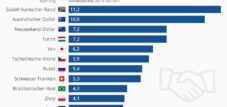Madness in EU trade: Why German companies often face greater hurdles than when exporting overseas
Xpert pre-release
Language selection 📢
Published on: September 12, 2025 / Updated on: September 12, 2025 – Author: Konrad Wolfenstein

Madness in EU trade: Why German companies often face greater hurdles than when exporting overseas – Image: Xpert.Digital
Hidden cost trap EU: This “internal tariff” costs Germany 146 billion euros annually
### "The horses have run away": How Brussels bureaucracy is strangling German trade ### A labyrinth instead of a free market: German companies are fleeing EU bureaucracy ### 1 rule gone, 5 new ones added: The shocking truth about the EU's regulatory frenzy ###
The paradoxical reality of the European internal market
How is it possible that German companies sometimes encounter fewer obstacles when exporting to the United States or other third countries than when trading with their European neighbors? This seemingly absurd situation is by no means an isolated incident, but rather reflects a systematic problem of the EU internal market, which, after more than 30 years of existence, is still far from complete.
The European single market, originally conceived as the heart of European integration, is increasingly developing into a bureaucratic labyrinth. While customs barriers between EU member states have long since been abolished, new, often more subtle trade barriers have emerged through a web of special national regulations, differing implementations of European directives, and excessive bureaucracy. The result is a paradox: a theoretically free single market that, in practice, often causes more problems for German exporters than business with countries outside the EU.
Suitable for:
- The EU internal market: Open construction sites, need for reform and options for action – in focus: industry, mechanical engineering and logistics
How serious are the extent of trade barriers within the EU?
The magnitude of the problem is clearly illustrated by recent studies by the International Monetary Fund. According to these studies, the requirements, standards, and reporting obligations existing within the EU correspond to a virtual internal tariff of 44 percent on industrial goods. For services, these hidden trade barriers even reach a level of 110 percent. These figures illustrate that intra-EU trade barriers are now three times the 20 percent tariffs on EU imports imposed by US President Trump.
This situation becomes particularly dramatic when one considers the development over time. While the costs of trade in services within the EU have decreased by an estimated eleven percent since the mid-1990s, the barriers to imports from third countries have fallen by 16 percent. This development has made imports into the EU increasingly more attractive than trade between EU member states. The International Monetary Fund has calculated that these bureaucratic barriers cost Germany up to €146 billion in economic output annually.
What specific problems arise when workers are posted abroad?
A particularly vivid example of the problems of the fragmented EU internal market is the posting of workers. This clearly demonstrates how well-intentioned European regulations can become a bureaucratic nightmare due to differing national implementations. German companies wishing to post employees to other EU countries are faced with a maze of various registration portals, inconsistent digital procedures, and differing minimum wage calculations.
The complexity of the situation is illustrated by an example from the DIHK's practice: A medium-sized mechanical engineering company that installs, maintains, and repairs its machines throughout the EU must submit approximately 3,500 posting declarations annually for the posting of its employees. This bureaucratic burden leads 55 percent of companies to complain about a lack of transparency in legislation, 52 percent report difficulties in accessing public contracts, and 50 percent see local certification requirements as a problem.
The consequences of these bureaucratic hurdles are dramatic: 83 percent of companies report difficulties due to bureaucratic hurdles and uncertainties in implementing regulations such as the Supply Chain Due Diligence Act, the requirements of the Packaging Directive, and the EU Carbon Border Adjustment. As a result, many companies are even considering withdrawing from individual EU member states or completely refraining from exports to certain European countries.
How does the national implementation of European directives differ?
A central problem of the EU internal market lies in the varying national implementation of European directives. While regulations are directly applicable in all EU member states, directives must be transposed into national law by individual countries. This flexibility, originally intended as a strength of the European legal system, is increasingly becoming an obstacle to free trade.
The problem is particularly evident in the freedom to provide services. Although this is enshrined as one of the four fundamental freedoms of the EU, differing national regulations lead to significant distortions of competition. German exporters report disproportionate and sometimes harassing bureaucratic hurdles in other EU member states. Companies are often confronted with administrative portals that do not operate in English, but only in the respective national language.
The differing application of EU law leads to a situation in which German companies must meet completely different requirements for the same product or service in different EU countries. This fundamentally contradicts the basic idea of the internal market and creates costs that are often higher than for business with third countries, where at least uniform and predictable rules apply.
What role does excessive EU bureaucracy play?
The bureaucratic burden in the EU has increased dramatically in recent years. Instead of the promised "one in, one out" principle, according to which every new regulation would be abolished, another would be abolished, more and more regulations are being created. In 2021, 1.5 new laws were added at the EU level for every one abolished; by 2022, the ratio had already reached 1 to 3.5; and in June 2024, five new laws were added for every one abolished.
This flood of regulations affects all sectors of the economy. The EU Chemicals Regulation "REACH" creates complex approval procedures, and the Medical Devices Regulation threatens to impose increasing documentation requirements even on standard products such as disposable pipettes, millions of which have already been manufactured for 20 years. The EU taxonomy and sustainability reporting bring with them further bureaucratic requirements that are particularly overwhelming for small and medium-sized enterprises.
Chancellor Olaf Scholz summed up the problem when he described EU regulation as one of the biggest problems facing the German economy and criticized the fact that some of the single market's regulations had "gone crazy." As an example, he cited the 1,500 reporting points on sustainability stipulated by the EU.
Why are exports to third countries often easier?
Paradoxically, German exporters often find trade with countries outside the EU less complicated than intra-European trade. This is due to several structural factors that make business with third countries more transparent and predictable.
When exporting to third countries, uniform EU-wide regulations apply. While the two-stage export procedure is complex, it is standardized and predictable. German companies know exactly which documents they need, which customs procedures must be observed, and which preferential treatments are available. This clarity and uniformity stands in sharp contrast to the 27 different national regulations within the EU.
In addition, many third countries have simplified and digitized their import regulations and customs procedures in recent decades to attract foreign investment. China, the US, and other major economies often offer uniform, centralized contact points for importers, while German companies in the EU are faced with different national authorities, portals, and procedures.
What impact does this have on German companies?
The consequences of intra-EU trade barriers for German companies are dramatic and complex. More than half of companies operating abroad (58 percent) report additional trade barriers in the past twelve months. Local certification requirements (59 percent) and increased security regulations (45 percent) in particular complicate planning and drive up costs.
The bureaucratic burdens are leading to concrete investment decisions: 56.4 percent of companies reported having canceled planned investments in the past two years due to bureaucratic hurdles. For companies complaining about bureaucracy caused by supply chain regulations, the figure is as high as 65 percent. Even more serious is that 23.6 percent of the affected companies have relocated projects abroad.
The German Chamber of Industry and Commerce reports that German companies "sometimes even report disproportionate and sometimes harassing bureaucratic hurdles." This situation is leading some companies to consider withdrawing from individual EU member states or deciding not to export their products to certain European countries.
How is the relationship with other regions of the world developing?
While internal trade barriers within the EU are increasing, trade relations with other regions of the world are developing differently. Particularly noteworthy is the development of trade with the US, which was traditionally considered more complicated than intra-European trade.
Despite the tariffs and trade restrictions introduced by US President Trump, the US remains Germany's most important export market outside the EU. Germany exported goods worth €158 billion to the US in 2024, achieving an export surplus of €17.7 billion in the first quarter of 2025. This success is all the more remarkable given that German companies face clear, albeit high, tariffs in the US, while in the EU they must contend with a confusing web of special national regulations.
Trade relations with China are also showing interesting developments. Although German companies in China cite the requirement for local content as an obstacle (44 percent of respondents), the regulations there are transparent and predictable. German exporters know what to expect and can align their business strategies accordingly.
What solutions are there to the EU bureaucracy problem?
In light of the dramatic situation, business associations and politicians have developed various solutions. The German Chamber of Industry and Commerce has presented more than 50 concrete proposals for reducing existing and preventing future EU bureaucracy. These proposals include both short-term relief measures and structural reforms of the European legislative process.
Among the most important demands are the harmonization of the posting of workers within the EU, a uniform implementation of the Packaging Directive, and the simplification of the approval procedures for the EU chemicals regulation "REACH." At the same time, the trade associations are calling for a fundamental reorientation of EU legislation based on the principle of "efficiency and simplification over regulation."
One promising approach is strengthening central online portals that provide comprehensive and easily accessible information for trade within the single market. Streamlining bureaucratic processes and reducing reporting requirements appears equally important. The European Commission has already launched an initiative to reduce existing reporting requirements, but at the same time, new obligations are constantly being imposed on companies.
🔄📈 B2B trading platforms support – strategic planning and support for exports and the global economy with Xpert.Digital 💡
Business-to-business (B2B) trading platforms have become a critical part of global trade dynamics and thus a driving force for exports and global economic development. These platforms offer significant benefits to companies of all sizes, particularly SMEs – small and medium-sized businesses – which are often considered the backbone of the German economy. In a world where digital technologies are becoming increasingly prominent, the ability to adapt and integrate is crucial to success in global competition.
More about it here:
27 systems, one problem: Why standards for construction, mechanical engineering and electrical engineering are overdue
What role does digitalization play in problem solving?
Digitalization offers considerable potential for simplifying the EU internal market, but has so far been insufficiently exploited. A key problem is that each member state has developed its own digital systems and portals without paying attention to compatibility or uniform standards.
Regarding the posting of workers, the European Commission is working on a common public interface for declarations of posting (e-declaration). This system has the potential to significantly reduce the administrative burden for companies. However, it is critical that participation by member states is voluntary. Without an EU-wide obligation to use the portal, the potential of a uniform platform can only provide limited relief for companies.
The digitalization of administrative procedures could also bring significant improvements in other areas. Uniform digital certification procedures, cross-border compatible reporting systems, and automated compliance checks could drastically reduce costs for companies. However, so far, there is no political will to surrender national sovereignty in favor of European efficiency.
Suitable for:
How do the problems affect small and medium-sized enterprises?
Small and medium-sized enterprises (SMEs) are particularly hard hit by intra-EU trade barriers. They often lack the resources to manage complex bureaucratic procedures in 27 different Member States or to establish specialized legal and compliance departments.
The Eurochambres survey shows that small and medium-sized enterprises face particular challenges. They are disproportionately affected by opaque legislation, disparate reporting portals, and inconsistent digital processes. While large corporations can often maintain dedicated compliance teams for each major market, SMEs must manage this complexity with limited resources.
The result is an increasing concentration of intra-European trade on large companies, while smaller businesses are excluded from the EU single market. This fundamentally contradicts the European ideal of an open and fair market economy. Studies by the Ifo Institute show that reducing trade barriers in the EU single market offers significant potential, especially for small and medium-sized enterprises.
Which sectors are particularly affected?
The impact of intra-EU trade barriers varies greatly across different sectors. Sectors that rely on cross-border services or manufacture complex technical products are particularly affected.
The construction industry is particularly affected by differing national building regulations and certification requirements. Architects and engineers must provide different qualification certificates and comply with different planning guidelines in each EU country. The German Federal Chamber of Architects has repeatedly pointed out that excessive deregulation is not the right approach, but rather that appropriate harmonization of professional qualifications is necessary.
While the mechanical engineering and electrical engineering industries generally benefit from a common European market, they suffer from differing safety standards and certification procedures. Deloitte calculations show that these sectors in particular would benefit from the removal of intra-EU trade barriers. German industrial exports to European markets could experience significantly higher growth, in some countries even double, if existing trade barriers were removed.
What political initiatives are there to improve the situation?
The problem of intra-EU trade barriers has now reached the highest political level. EU Commission President Ursula von der Leyen has presented a new Single Market Strategy that focuses on reducing bureaucracy and improving the enforcement of the Single Market.
The German federal government has also recognized the need for action. At the German Employers' Day, Chancellor Scholz called for "finally reducing bureaucracy, and on a large scale," and announced that he would tackle the controversial Supply Chain Due Diligence Act before the end of 2024. Federal Minister for Economic Affairs Katherina Reiche (CDU) denounced the billions in losses caused by Brussels bureaucracy and called for a fundamental reform of EU regulations.
At the EU level, the Commission is working on an omnibus package designed to simplify various existing directives. With this legislative package, the EU Commission aims to reduce annual administrative costs for companies by €400 million. Critics, however, argue that this amount is merely a drop in the ocean, given the total annual burden of €65 billion.
What could a successful reform of the EU internal market look like?
A successful reform of the EU internal market must be implemented on several levels. First, a fundamental reorientation of European legislation is required. The "one in, one out" principle must be truly implemented and safeguarded by effective control mechanisms.
A central component of a reform would be the complete harmonization of key business processes. Instead of 27 different national regulations for the posting of workers, product certification, or environmental standards, uniform European standards should be created. These do not have to be based on the lowest common denominator, but can certainly guarantee high standards of protection as long as they are uniform and transparent.
Digitalization must be used as a driver for simplification. A genuine Digital Single Market strategy would create uniform European portals for all key business processes. Companies should have access to all relevant information and procedures in all 27 Member States via a central platform.
At the same time, the principle of subsidiarity must be strengthened. Not every area of economic life requires European regulation. Areas that can be better regulated at the national or regional level should be left there. This would create space to focus on the truly essential areas for a functioning internal market.
What opportunities arise from a successful reform?
The potential for a successful EU internal market reform is enormous. Studies by the Ifo Institute show that a comprehensive reduction of barriers in the EU internal market for services would permanently increase gross value added by 2.3 percent, or €353 billion. In Germany, economic output would be permanently higher by 1.8 percent, or approximately €68 billion, in the long term.
The potential for German exports to European markets is particularly impressive. Deloitte calculations show that German industrial exports to France, Europe's largest sales market, could grow by an average of 3.9 percent per year until 2035 if internal EU trade barriers were completely eliminated. Without European deregulation, this would be only 2.7 percent. In the Netherlands and Italy, sales growth could reach 5.2 and 4 percent, respectively – compared to 2.9 and 1.8 percent without bureaucracy reduction.
These figures demonstrate that the European market has the potential to more than compensate for shrinking exports to other regions of the world. Given the escalating trade conflicts with the US and growing competition from Asia, a reform of the EU internal market could open up new growth opportunities for German companies on their own doorstep.
What obstacles stand in the way of reform?
Despite the obvious benefits of EU internal market reform, significant political and structural obstacles stand in its way. The main problem lies in the national sovereignty of member states, who are reluctant to hand over powers to Brussels.
Any harmonization of European standards means that individual member states lose the opportunity to take their national specificities into account. Germany, for example, has traditionally maintained very high environmental and occupational health and safety standards, which it does not want to abandon in favor of a European average. Other countries, in turn, fear that European standards could impair their competitiveness.
Another obstacle lies in the established administrative structures. National authorities, which have developed their own procedures and systems over decades, are often unwilling to abandon them in favor of European solutions. This applies both to the administrations themselves and to the stakeholders associated with them, from law firms to consulting firms, who benefit from the complexity of the system.
Ultimately, there is often a lack of political will for unpopular reforms. While reducing bureaucracy sounds good, it also means the loss of administrative jobs and the abandonment of cherished national traits. Politicians shy away from such decisions, especially since the benefits often only become apparent in the long term, while the costs are felt immediately.
How do companies assess current reform efforts?
German companies' assessment of the current EU reform efforts is mixed. While they welcome the general direction of the measures announced by the European Commission, many companies criticize the lack of pace and limited scope of the reforms.
Ninety-five percent of the companies surveyed in the DIHK Business Barometer for the 2024 EU elections confirm that bureaucracy is slowing down the German economy. They consider reducing bureaucracy a top priority to increase Europe's competitiveness as a business location. However, the measures announced so far are perceived as insufficient.
DIHK Vice President Kirsten Schoder-Steinmüller sums up the frustration of companies: "My daily work is now characterized by checking, completing, filing, and reporting. Every euro spent on fulfilling reporting requirements is no longer available for investment or innovation." Business expectations are high, she says, but a completely new approach is needed to consistently set the course for efficiency and simplification in legislation.
What impact does the situation have on Europe’s competitiveness?
The paradoxical situation that German companies often face greater hurdles in intra-EU trade than in overseas exports has far-reaching implications for Europe's competitiveness as a business location. This problem not only weakens individual companies but undermines the entire European integration project.
Europe is in global competition for investment, innovation, and economic dynamism. While competitors like the US and China are making their markets more attractive through deregulation and digitalization, Europe is losing appeal due to its bureaucratic hurdles. Companies that can choose between different locations are increasingly deterred by complex European regulations.
The fragmentation of the EU single market means that European companies cannot achieve the economies of scale that a truly unified market of 447 million people could offer. Instead, they must contend with 27 different national markets, which hampers innovation and growth. This situation is particularly problematic at a time when technological disruption and global challenges require rapid and flexible responses.
Current developments clearly demonstrate that if Europe wants to maintain its position as a leading economic area, it must make the completion of the single market its absolute priority. The alternative would be a further loss of importance in global competition and the risk that European companies will increasingly seek their future outside Europe.
Your global marketing and business development partner
☑️ Our business language is English or German
☑️ NEW: Correspondence in your national language!
I would be happy to serve you and my team as a personal advisor.
You can contact me by filling out the contact form or simply call me on +49 89 89 674 804 (Munich) . My email address is: wolfenstein ∂ xpert.digital
I'm looking forward to our joint project.

























